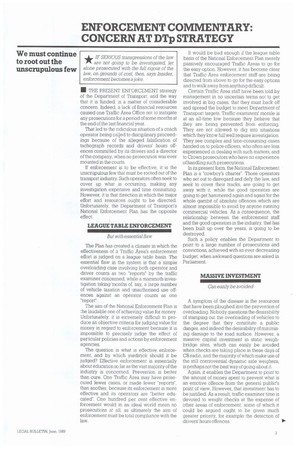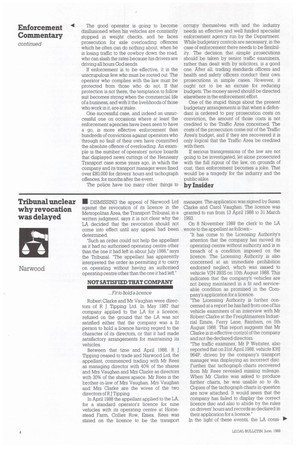We must continue to root out the unscrupulous few
Page 101

Page 102

If you've noticed an error in this article please click here to report it so we can fix it.
4,, IF SERIOUS transgressions of the law PR are not going to be investigated, let alone prosecuted with the full rigour of the law, on grounds of cost, then, says Insider, enforcement becomes a joke.
• THE PRESENT ENFORCEMENT strategy of the Department of Transport, and the way that it is funded, is a matter of considerable concern. Indeed, a lack of financial resources caused one Traffic Area Office not to instigate any prosecutions for a period of some months at the end of the last financial year.
That led to the ridiculous situation of a coach operator being called to disciplinary proceedings because of the alleged falsification of tachograph records and drivers hours offences committed by its drivers and a director of the company, when no prosecution was ever mounted in the courts.
If enforcement is to be effective, it is the unscrupulous few that must be rooted out of the transport industry. Such operators often seek to cover up what is occurring, making any investigation expensive and time consuming. However, it is that direction in which the major effort and resources ought to be directed. Unfortunately, the Department of Transport's National Enforcement Plan has the opposite effect.
LEAGUE TABLE ENFORCEMENT But with essential flaw The Plan has created a climate in which the effectiveness of a Traffic Area's enforcement effort is judged on a league table basis. The essential flaw in the system is that a simple overloading case involving both operator and driver counts as two "reports" by the traffic examiner concerned, while a mammoth investigation taking -months of, say, a large number of vehicle taxation and unauthorised use offences against an operator counts as one "report".
The aim of the National Enforcement Plan is the laudable one of achieving value for money. Unfortunately, it is extremely difficult to produce an objective criteria for judging value for money in regard to enforcement because it is impossible to precisely judge the effect of particular policies and actions by enforcement agencies.
The question is what is effective enforcement, and by which yardstick should it be judged? Effective enforcement is essentially about education so far as the vast majority of the industry is concerned. Prevention is better than cure. One Traffic Area may have prosecuted fewer cases, or made fewer 'reports", than another, because its enforcement is more effective and its operators are "better educated'. One hundred per cent effective enforcement would in an ideal world mean no prosecutions at all, as ultimately the aim of enforcement must be total compliance with the law.
It would be bad enough if the -league table basis of the National Enforcement Plan merely passively encouraged Traffic Areas to go for the easy option. However, it has become clear that Traffic Area enforcement staff are being directed from above to go for the easy options and to walk away from anything difficult.
Certain Traffic Area staff have been told by management in no uncertain terms not to get involved in big cases, that they must back off and spread the budget to meet Department of Transport targets. Traffic examiners' morale is at an all-time low because they believe that they are being prevented from enforcing. They are not allowed to dig into situations which they know full well require investigation. They see complex and time-consuming cases handed on to police officers, who often are less experienced in dealing with such matters, and to Crown prosecutors who have no experience of handling such prosecutions.
In its present form, the National Enforcement Plan is a "cowboy's charter". Those operators who set out to disregard and defy the law, and seek to cover their tracks, are going to get away with it, while the good operators are going to get hammered again and again for the whole gambit of absolute offences which are almost impossible to avoid by anyone running commercial vehicles. As a consequence, the relationship between the enforcement staff and the good operators in the industry, that has been built up over the years, is going to be destroyed.
Such a policy enables the Department to point to a large number of prosecutions and convictions, achieved with an ever decreasing budget, when awkward questions are asked in Parliament.
MASSIVE INVESTMENT Can easily be avoided
A symptom of the disease is the resources that have been ploughed into the prevention of overloading. Nobody questions the desirability of stamping out the overloading of vehicles to the degree that they constitute a public danger, and indeed the desirability of minimising damage to the road surface. However, a massive capital investment in static weighbridge sites, which can easily be avoided when checks are taking place in these days of CB radio, and the majority of which make use of the still controversial dynamic axle weighers, is perhaps not the best way of going about it.
Again, it enables the Department to point to the amount of money spent to prevent what is an emotive offence from the general public's point of view. However, that investment has to be justified As a result, traffic examiner time is devoted to weight checks at the expense of other areas of enforcement, some of which it could be argued ought to be given much greater priority, for example the detection of drivers' hours offences. The good operator is going to become disillusioned when his vehicles are constantly stopped in weight checks, and he faces prosecution for axle overloading offences which he often can do nothing about, when he is losing traffic to the cowboy down the road, who can slash the rates because his drivers are driving all hours God sends.
If enforcement is to be effective, it is the unscrupulous few who must be rooted out. The operator who complies with the law must be protected from those who do not. If that protection is not there, the temptation to follow suit becomes strong when the commercial life of a business, and with it the livelihoods of those who work in it, are at stake.
One successful case, and indeed an unsuccessful one on occasions where at least the enforcement agencies have been seen to have a go, is more effective enforcement than hundreds of convictions against operators who through no fault of their own have committed the absolute offence of overloading. An example is the number of operators' notice boards that displayed news cuttings of the Hennessy Transport case some years ago, in which the company and its transport manager were fined over £80,000 for drivers' hours and tachograph offences, for months after the event.
The police have too many other things to occupy themselves with and the industry needs an effective and well funded specialist enforcement agency run by the Department. While budgetary controls are necessary, in the case of enforcement there needs to be flexibility. The decision that simple prosecutions should be taken by senior traffic examiners, rather than dealt with by solicitors, is a good one. After all, trading standards officers and health and safety officers conduct their own prosecutions in simple cases. However, it ought not to be an excuse for reducing budgets. The money saved should be directed elsewhere in the enforcement effort.
One of the stupid things about the present budgetary arrangements is that when a defendant is ordered to pay prosecution costs on conviction, the amount of those costs is not credited to the Traffic Area concerned. The costs of the prosecution come out of the Traffic Area's budget, and if they are recovered it is only logical that the Traffic Area be credited with them.
If serious transgressions of the law are not going to be investigated, let alone prosecuted with the full rigour of the law, on grounds of cost, then enforcement becomes a joke. That would be a tragedy for the industry and the public alike.
by Insider












































































































































